Key takeaways:
- Understanding creditworthiness and maintaining a good credit score is essential for securing financing.
- Regularly checking credit reports and addressing errors can lead to significant improvements in credit scores.
- Establishing a consistent payment schedule and prioritizing high-interest debt fosters financial control and credit improvement.
- Building strong relationships with lenders and preparing comprehensive business plans are crucial for financing projects, such as mining ventures.
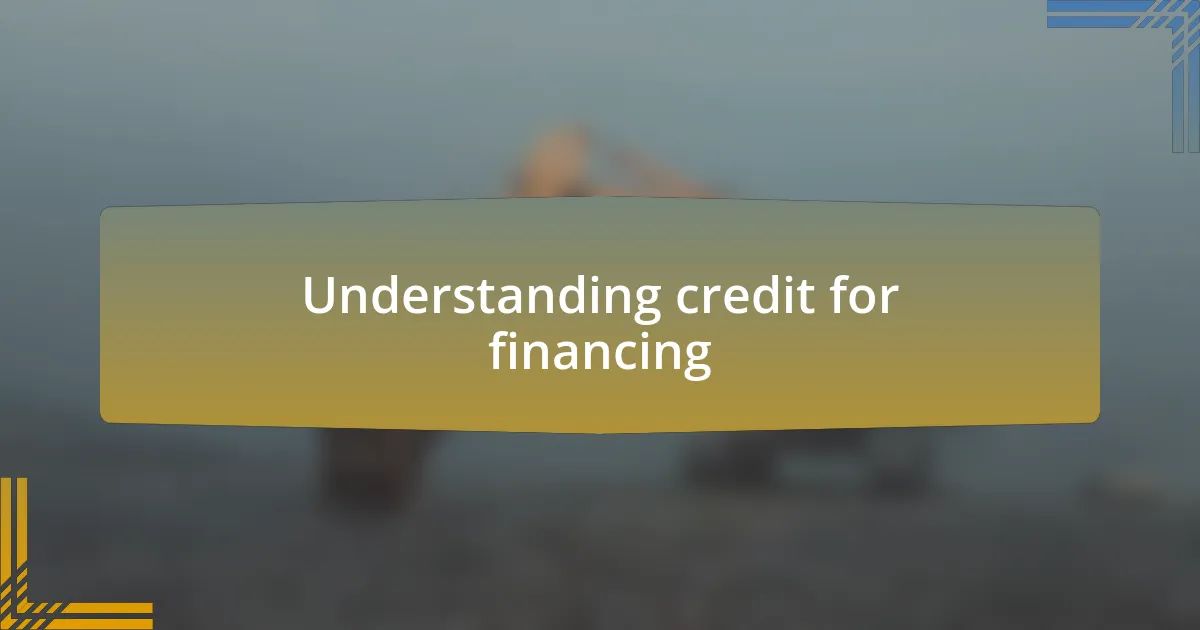
Understanding credit for financing
Understanding credit for financing can feel daunting, but knowing how it works can significantly impact your financial journey. When I first started exploring financing options, I wondered how lenders decided whom to trust with their money. It’s all about creditworthiness, which is essentially how likely you are to repay borrowed funds based on your credit history.
Your credit score is a crucial piece of that puzzle. I recall the moment I checked my own score for the first time and felt a mix of surprise and anxiety. A score below a certain threshold can limit your options, but understanding the factors that influence your score, like payment history and credit utilization, was empowering for me. Have you ever felt overwhelmed by a number that seemed to dictate your financial future?
Building credit is not just about maintaining a good score; it’s about forging a relationship with lenders. I remember the excitement of qualifying for my first loan after months of effort to improve my credit. It felt like not just a financial achievement but a validation of my hard work and responsibility. That sense of accomplishment made the process not only educational but also rewarding.
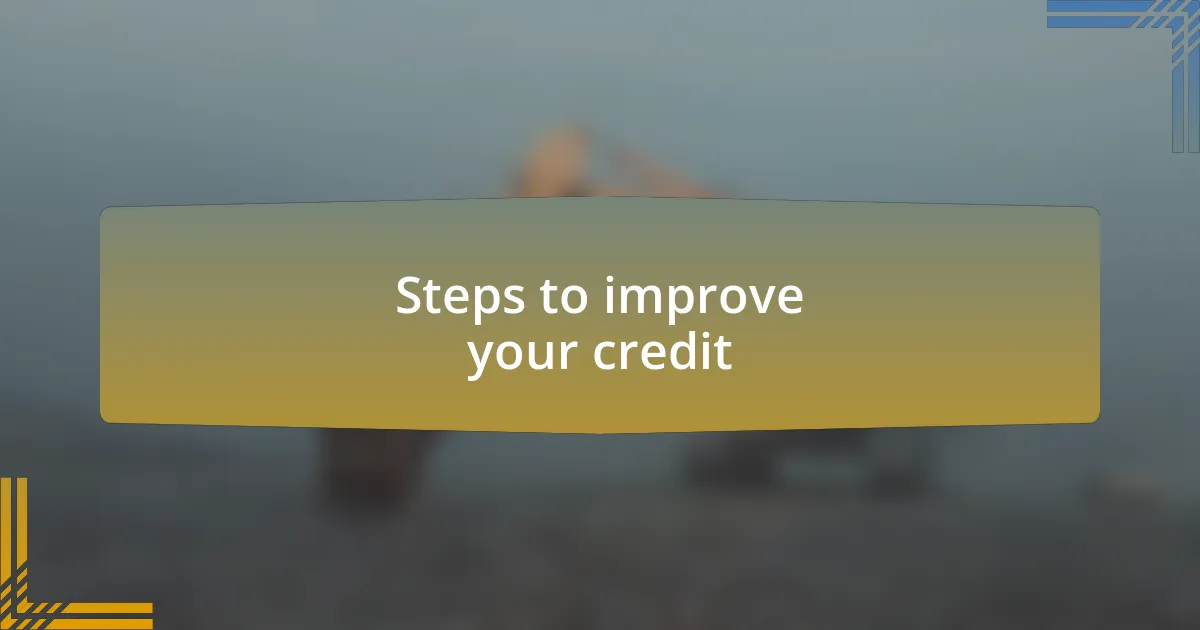
Steps to improve your credit
One of the first steps I took to improve my credit was to check my credit report for errors. When I did this, I was shocked to find a few discrepancies that misrepresented my payment history. All it took was a few phone calls to dispute those inaccuracies, and I saw my score rise shortly after. Have you checked your report recently? It might hold secrets that could boost your credit.
Next, I made it a priority to pay down existing debt, especially high credit card balances. Unlike my earlier habits of making only minimum payments, I shifted my focus to paying off the debt with the highest interest rate first. Watching my balances decrease over time not only improved my credit utilization ratio, but it also provided a significant emotional lift. Isn’t it satisfying to see tangible results from your efforts?
Establishing a consistent payment schedule was another crucial step. I set reminders to ensure I never missed a payment – a small change that made a big difference. There were moments when it felt tedious, but knowing that I was building my credit and paving the way for future financing kept me motivated. Have you found a rhythm that works for you in managing payments?
![]()
Tracking your credit score
When it comes to tracking your credit score, regularly checking your score helped me feel more in control of my financial journey. I remember the sense of empowerment I felt seeing my score slowly rise after making consistent payments. It’s like watching a plant grow: at first, it seems slow, but once you notice the changes, it motivates you to nurture it even more. How often do you look at your credit score?
I also discovered how useful various credit monitoring tools can be. Using an app that notifies me of changes and updates made the process more manageable. I can still recall the moment I received an alert about a new account opening; I quickly realized I needed to address that. Have you considered using any tools to stay updated on your credit status? They could be game-changers for your financial health.
Finally, tracking my credit score reminded me how essential it is to understand the factors that influence it. For instance, I became more aware of how my credit utilization affected my score. Seeing the numbers shift each month taught me the direct impact of my financial decisions. Have you taken the time to learn what drives your credit score? This knowledge could transform how you approach your credit management.
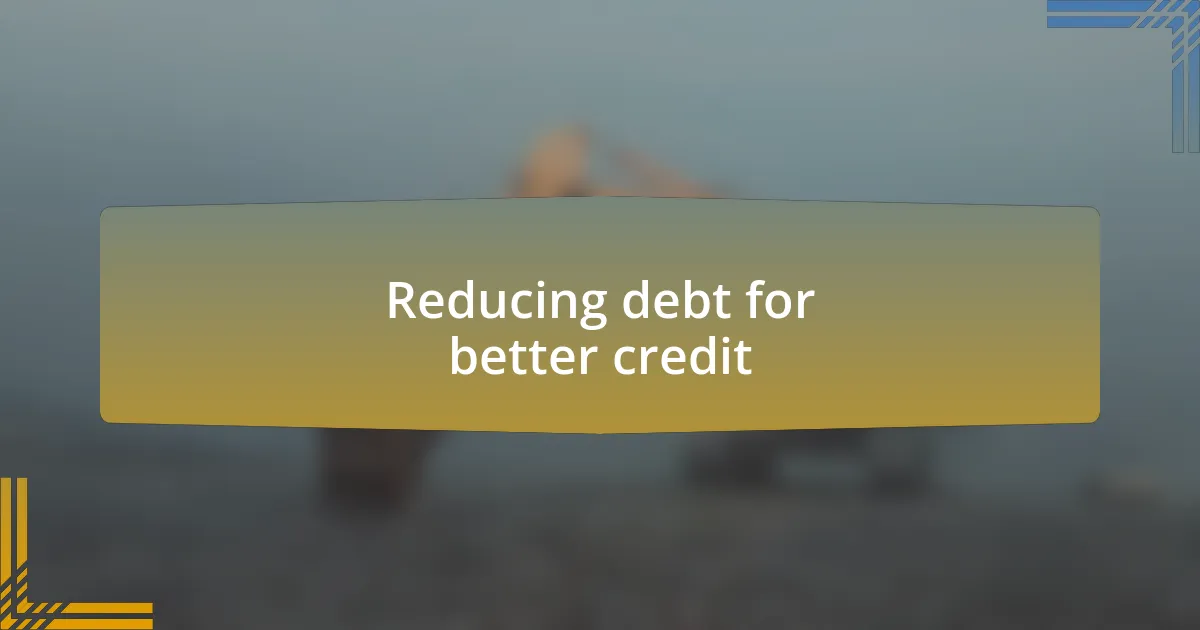
Reducing debt for better credit
Reducing debt is pivotal for improving your credit score, and I learned this through firsthand experience. I remember the weight lifted off my shoulders once I focused on paying down my credit card balances. Each time I reduced my debt, I felt a surge of accomplishment. Have you ever felt that rush of relief after making a payment? It’s genuinely rewarding to see the numbers drop and realize you’re on the path to better financial health.
One impactful strategy that worked for me was prioritizing high-interest debt first. I started with the credit card that had the highest interest rate, and I made extra payments whenever I could. It was challenging at times, especially watching my savings dwindle, but seeing the balance decrease month after month provided tangible proof of my progress. How do you tackle your debts? Finding a method that resonates with you can be a game changer.
Ultimately, I found that reducing my debt not only boosted my credit score but also gave me a renewed sense of control over my finances. It shifted my mindset; rather than feeling overwhelmed, I started viewing my debt like a challenge to conquer. How do you perceive your financial journey? Shifting your perspective can be just as crucial as the practical steps you take.
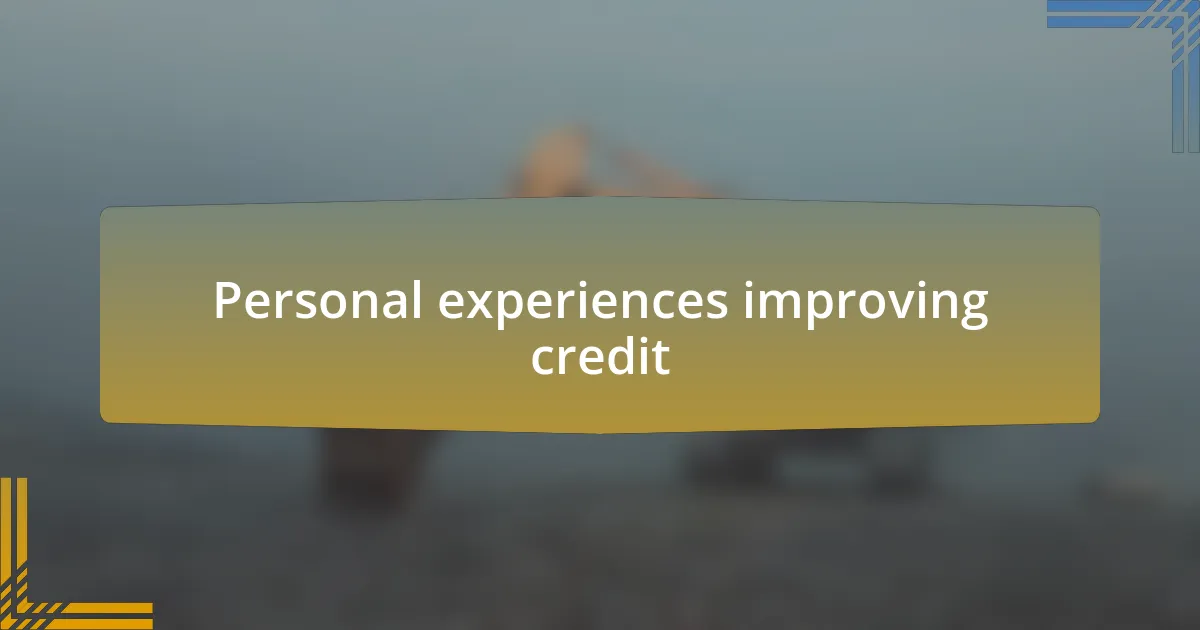
Personal experiences improving credit
One key lesson I learned in my journey to improve my credit was the importance of making timely payments. There was a period when I missed a couple of payments, and I still remember the sinking feeling when I checked my credit report and saw the negative impact. Since then, I adopted a habit of setting reminders on my phone. Doesn’t it feel great when you finally take control over your own schedule? That little adjustment made a big difference in keeping my score on the right track.
In my experience, utilizing credit responsibly was also crucial. I decided to obtain a secured credit card, something I was initially skeptical about. I started using it for small purchases, and paying it off entirely each month became my mantra. The thrill of seeing my score improve with every positive report felt empowering. Have you ever noticed how those small wins can motivate you to keep going? Achieving small milestones reinforced my determination to maintain good credit habits.
Lastly, I found that being proactive in monitoring my credit report opened my eyes to adjustments I needed to make. I recall feeling a mix of anxiety and confidence as I pulled up my credit report for the first time, searching for errors. When I discovered inaccuracies and took the time to dispute them, I felt like I was taking a stand for my financial future. Can you imagine how liberating it is to know you’re actively participating in your own financial well-being? Every little action contributed to a stronger credit profile, and I realized how empowered I truly could be.
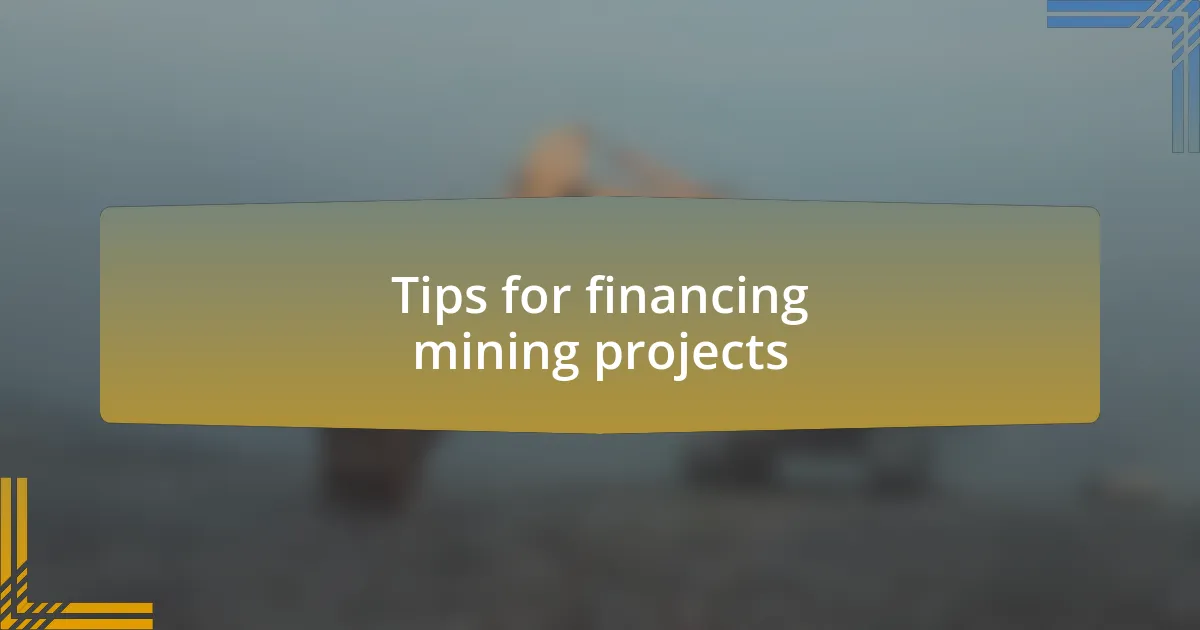
Tips for financing mining projects
When financing mining projects, carefully assessing potential funding sources is paramount. I remember a time when I oversaw a project with tight budget constraints. By exploring diverse funding avenues, including private investors and government grants, I learned that the right combination could significantly enhance our financial flexibility. Have you ever unearthed a funding source that made all the difference for your project?
It’s vital to prepare a comprehensive business plan tailored for your mining project. I once drafted a proposal that focused heavily on market research and future profitability projections. The feedback I received was overwhelmingly positive, confirming my suspicion that a detailed plan helps not only in securing financing but also in building confidence among stakeholders. Does your current project have a roadmap that truly reflects its potential?
Lastly, developing strong relationships with lenders can be invaluable in the financing process. I’ll never forget the rapport I built with a local bank representative during a previous venture. By communicating clearly and demonstrating my commitment, I cultivated trust, which ultimately led to favorable loan terms. Have you taken time to nurture those crucial connections in your own financing efforts? Each relationship can pave the way for future opportunities.